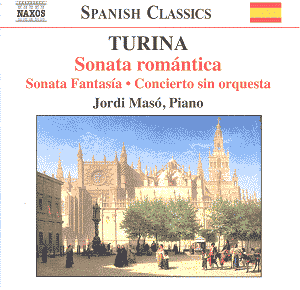Turina was one of a
number of Spanish composers to come
of age in the early years of the twentieth
century. He found himself heavily under
the influence of the then-new French
music that came to be called Impressionistic.
After the premiere of his piano quintet,
in France in 1907, his countryman Albéniz
was to corner him and insist that although
his new work was very fine and would
surely be published, he must never again
write music that was not influenced
by the folk music of his native Andalusia.
In spite of his great admiration for
Albéniz, and his valiant efforts
to make his music more Spanish, the
influence of France was never far from
the surface in his later works.
In this installment
of the ongoing Naxos Spanish music series,
we explore four significant works for
solo piano by Turina, each beautifully
crafted, moody, virtuosic and original
in its own unique way. In the Sonata
Romantica, the composer follows
the advice of his elder mentor and bases
the work on the Spanish folk song El
vito, going so far as to compose
a theme and variations for its first
movement. The homage to his mentor is
significant as Turina was mourning Albénizís
recent death while he composed it. This
is a solid work, and although there
is never an absence of melody, there
is also a tremendous drama to the piece.
Above all, one gets a great sense of
the warm and lovely Spanish countryside,
and its calm and never hurried way of
life.
The Sonata Fantasia
is a much more expressive work,
dedicated to the music critic and historian
Josep Subrià. The remarkable
slow introductions are packed with arching
melodic lines and deep rich harmonies,
offset by the occasional burst of energy.
Rincón mágico,
or ĎMagic cornersí are little reflections
on the private places in which the composer
enjoyed quiet private time. In reality
they are four little character pieces
grouped together to form a sonata, but
each of the movements would stand alone
without difficulty as a miniature portrait
of the composerís thoughts.
A neglected work, the
Concerto without orchestra is
the most blatantly showy piece on the
program and although the virtuosity
is never carried overboard, there is
still a great deal here with which to
show off the pianistís fingers.
Jordi Masó has
ample technique and a fine sense of
taste. He uses an enormous palette of
colors in his performances, and always
maintains an underlying carpet of good
taste and finesse, even when the music
calls for more of a flashy display.
He is obviously quite at home with the
music of his own country, but it is
also evident that he is well acquainted
with the music of Debussy and his circle,
music the influence of which is blatantly
obvious from the first notes.
Kudos to Naxos for
continuing to be leaders in the release
of interesting music at a bargain price.
Their constant expansion of the readily
available library of music may well
become a Denkmal of western civilization.
Kevin Sutton


